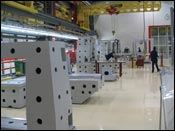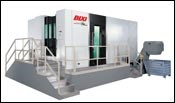Dixi Rising
Heavy investment in this Swiss builder’s production facility will allow its output to rise just as the demand for large machine tools capable of nano-precision is also rising.
Share





Le Locle, Switzerland (near Neuchatel), is the home of Dixi Machines. That has not changed. Dixi builds some of the most precise machine tools in the world. That has not changed. Its approach to manufacturing is characterized by traditional techniques such as hand-scraping of critical mating surfaces. That has not changed. Otherwise, Dixi has undergone major changes in the last few years. These changes reflect important trends and developments in today’s manufacturing scene.
Changes All Around
The company has changed hands. Once a family-owned company, Dixi was purchased by Mori Seiki of Nagoya, Japan, in a transaction completed in January 2007. This made Dixi part of a global machine tool company with a worldwide marketing presence and a worldwide network of service and support facilities. On its own, the company was not in the best position to maintain its operations on an international basis.
Since the acquisition, Mori Seiki has invested more than $23 million in renovations and enhancements to this plant. The 160,000-square-foot facility is now fully air-conditioned to maintain an ambient temperature that varies by only 0.2° C. The machine assembly area has been doubled to 40,000 square feet. A training center and spacious showroom have been added. Newly installed machine tools include a Toshiba bridge-type milling machine, a pair of large Taiyo Koki grinders and one of Mori Seiki’s largest turning centers. To take an online tour of the plant, go to www.mmsonline.com/articles/0408ex1.html and click on the link.
The acquisition of Dixi Machines also represents a change for Mori Seiki. Until now, the company had no production facilities outside Japan. However, its plants in Japan are operating at full capacity, so the refurbished Dixi facility is being used to assemble the builder’s NMV5000 five-axis vertical machining centers. This model was introduced late in 2006 and quickly became a top seller. Plans call for 10 of these units to be produced per month in Le Locle.
The perception of nano-precision machining has been changing. It is clear that some of the most important applications for this technology will involve large parts and high-volume production. Typical parts being produced on Dixi machines include automotive parts such as gearbox casings and engine blocks as well as aerospace parts such as jet engine casings, transmission housings and impellers.
Moreover, the need for extremely high volumetric accuracy is now recognized widely. Volumetric accuracy means that the stated accuracy will be achieved anywhere in the machine’s cubic work envelope. Achieving volumetric accuracy in microns is the overriding objective of the design and construction of Dixi machines.
Finally, it should be noted that the Dixi machines contradict another assumption often made about nano-precision machining—that it is only for finishing. High-torque, high horsepower motors on these machines allow roughing, semi-finishing and finishing operations in one setup.
A Good Place, A Good Fit
Le Locle is a good place, it seems, for a machine tool factory. A skilled workforce and well-attended technical schools can be found in the area. These are important factors because Mori Seiki expects employment at Dixi to grow from 120 to 220 or 250.
The fit between Dixi and Mori Seiki is good in other ways. When the Le Locle plant was officially reopened late last year, Dr. Masahiko Mori, president of Mori Seiki, spoke about historic connections between the two companies, which go back to 1997 when Mori Seiki acquired machines from Dixi for its plants in Japan. The two companies shared a common philosophy about machine tool design and construction techniques. For example, Dixi’s box-in-box machine structure follows principles closely akin to Mori’s driven-from-the-center-of-gravity designs. It was Mr. Paul Castella, Dixi’s head, who first approached Dr. Mori about purchasing the company. According to Dr. Mori, Mr. Castella was keenly interested in seeing the security of current Dixi employees and its customer base protected under new ownership. Fortunately, these concerns were in line with the opportunity that Dr. Mori saw in acquiring the company.
Most importantly, Dixi’s product line complemented Mori Seiki’s with no overlap. Dixi produces two lines, the JIG series of fixed-table HMCs (six variations), and the DHP series of HMCs with pallet changers and ATCs for production applications (eight variations). The 14 models in both series are built on two basic platforms for small- and large-worktable sizes. The JIG 700 and JIG 1200 have four- and five-axis configurations; the DHP 50 and DHP 80 have four-, five- and six-axis configurations. According to the company, the four-axis machines achieve volumetric accuracy of 15 microns (0.0005 inch), while the five- and six-axis machines achieve 25 microns (0.0009 inch).
Read Next
5 Rules of Thumb for Buying CNC Machine Tools
Use these tips to carefully plan your machine tool purchases and to avoid regretting your decision later.
Read MoreRegistration Now Open for the Precision Machining Technology Show (PMTS) 2025
The precision machining industry’s premier event returns to Cleveland, OH, April 1-3.
Read MoreSetting Up the Building Blocks for a Digital Factory
Woodward Inc. spent over a year developing an API to connect machines to its digital factory. Caron Engineering’s MiConnect has cut most of this process while also granting the shop greater access to machine information.
Read More




















.jpg;maxWidth=300;quality=90)











